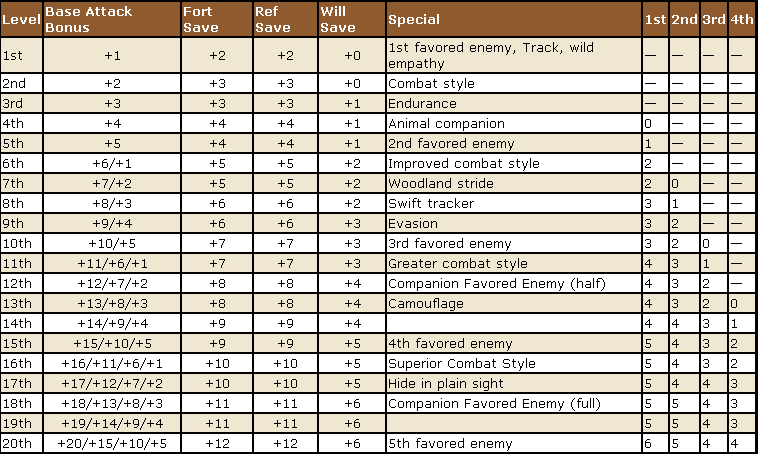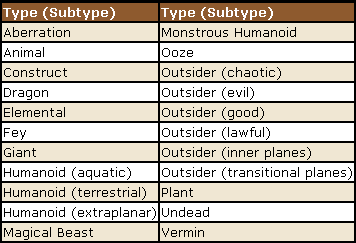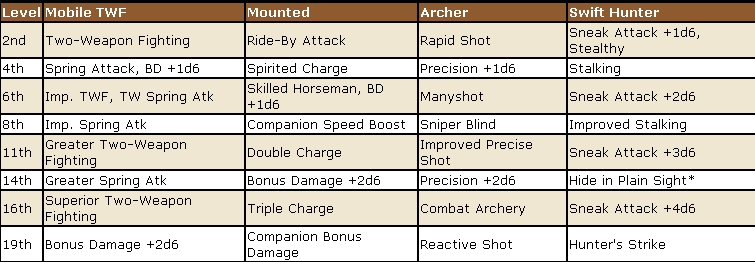I went looking around for a ranger rebuild that addressed these issues, but didn't really find one that didn't rub me the wrong way in some other fashion, so I've started to make my own. It follows. I'm looking for suggestions, so feel free to speak up. Without further ado, the beginnings of my rebuilt ranger:
Version: 0.11
Alignment: Any.
Hit Die: d8.
Class Skills
The ranger’s class skills (and the key ability for each skill) are Climb (Str), Concentration (Con), Craft (Int), Handle Animal (Cha), Heal (Wis), Hide (Dex), Jump (Str), Knowledge (dungeoneering) (Int), Knowledge (geography) (Int), Knowledge (nature) (Int), Listen (Wis), Move Silently (Dex), Profession (Wis), Ride (Dex), Search (Int), Spot (Wis), Survival (Wis), Swim (Str), and Use Rope (Dex).
Skill Points at 1st Level: (6 + Int modifier) x4.
Skill Points at Each Additional Level: 6 + Int modifier.

Class Features
All of the following are class features of the ranger.
Weapon and Armor Proficiency: A ranger is proficient with all simple and martial weapons, and with light armor and shields (except tower shields).
Favored Enemy (Ex): At 1st level, a ranger may select a type of creature from among those given on Table: Ranger Favored Enemies. The ranger gains a +2 bonus on Bluff, Listen, Sense Motive, Spot, and Survival checks when using these skills against creatures of this type. Likewise, he gets a +2 bonus on weapon damage rolls against such creatures.
The ranger may also make Knowledge checks against creatures of his favored enemy types as though he were trained in the relevant Knowledge skill. The ranger gains a bonus on this check equal to his ranger level plus his Intelligence modifier plus his favored enemy bonus against that creature; thus, a 5th level ranger with 13 INT and favored enemies of dragons (+4) and evil outsiders (+2) may make Knowledge checks against dragons with a bonus of +10 and evil outsiders with a bonus of +8. This does not count as a Knowledge skill for other purposes; while the above ranger could make checks to know about dragons as if he had Knowledge (arcana), he could not use this ability to make Knowledge checks about other subjects falling under that Knowledge skill, nor could he use the bonus to qualify for feats or abilities that have ranks in a Knowledge skill as a prerequisite. If the ranger has a Knowledge skill that covers one of his favored enemies, the bonuses do not stack; the ranger uses either the Knowledge skill or his favored enemy knowledge bonus, whichever is higher.
At 5th level and every five levels thereafter (10th, 15th, and 20th level), the ranger may select an additional favored enemy from those given on the table. In addition, at each such interval, the bonus against any one favored enemy (including the one just selected, if so desired) increases by 2.
If the ranger chooses humanoids or outsiders as a favored enemy, he must also choose an associated subtype, as indicated on the table. If a specific creature falls into more than one category of favored enemy, the ranger’s bonuses do not stack; he simply uses whichever bonus is higher. Creatures with templates granting the outsider type count as the base creature’s type for the purpose of favored enemy, and not as outsiders (unless the base creature is also an outsider).
The ranger may alternately select the favored terrain variant found on page 65 of Unearthed Arcana and in the SRD found at http://d20srd.org

Track: A ranger gains Track as a bonus feat.
Wild Empathy (Ex): A ranger can improve the attitude of an animal. This ability functions just like a Diplomacy check to improve the attitude of a person. The ranger rolls 1d20 and adds his ranger level and his Charisma bonus to determine the wild empathy check result. The typical domestic animal has a starting attitude of indifferent, while wild animals are usually unfriendly.
To use wild empathy, the ranger and the animal must be able to study each other, which means that they must be within 30 feet of one another under normal visibility conditions. Generally, influencing an animal in this way takes 1 minute, but, as with influencing people, it might take more or less time.
The ranger can also use this ability to influence a magical beast with an Intelligence score of 1 or 2, but he takes a –4 penalty on the check.
Combat Style (Ex): At 2nd level, a ranger must select one feat from the following list: Dodge, Mounted Combat, Point Blank Shot, Shield Specialization, or Two-Weapon Fighting. The ranger is treated as having the chosen feat for all purposes, though he need not meet the prerequisites.
The benefits of the ranger’s chosen style apply only when he wears light or no armor. He loses all benefits of his combat style when wearing medium or heavy armor.
Endurance: A ranger gains Endurance as a bonus feat at 3rd level.
Animal Companion (Ex): At 4th level, a ranger gains an animal companion selected from the following list: badger, camel, dire rat, dog, riding dog, eagle, hawk, horse (light or heavy), owl, pony, snake (Small or Medium viper), or wolf. If the campaign takes place wholly or partly in an aquatic environment, the following creatures may be added to the ranger’s list of options: crocodile, porpoise, Medium shark, and squid. This animal is a loyal companion that accompanies the ranger on his adventures as appropriate for its kind.
This ability functions like the druid ability of the same name, except that the ranger’s effective druid level is his ranger level minus three. A ranger may select from the alternative lists of animal companions just as a druid can, though again his effective druid level is his ranger level minus three. Like a druid, a ranger cannot select an alternative animal if the choice would reduce his effective druid level below 1st.
Spells: Beginning at 4th level, a ranger gains the ability to cast a small number of divine spells, which are drawn from the ranger spell list. A ranger must choose and prepare his spells in advance (see below).
To prepare or cast a spell, a ranger must have a Wisdom score equal to at least 10 + the spell level. The Difficulty Class for a saving throw against a ranger’s spell is 10 + the spell level + the ranger’s Wisdom modifier.
Like other spellcasters, a ranger can cast only a certain number of spells of each spell level per day. His base daily spell allotment is given on Table: The Ranger. In addition, he receives bonus spells per day if he has a high Wisdom score. When Table: The Ranger indicates that the ranger gets 0 spells per day of a given spell level, he gains only the bonus spells he would be entitled to based on his Wisdom score for that spell level. The ranger does not have access to any domain spells or granted powers, as a cleric does.
A ranger prepares and casts spells the way a cleric does, though he cannot lose a prepared spell to cast a cure spell in its place. A ranger may prepare and cast any spell on the ranger spell list, provided that he can cast spells of that level, but he must choose which spells to prepare during his daily meditation.
Through 3rd level, a ranger has no caster level. At 4th level and higher, his caster level is his ranger level minus three.
Improved Combat Style (Ex): At 6th level, a ranger’s aptitude in his chosen combat style improves. He may select any feat from his chosen Combat Style feat’s feat tree (that is, any feat that has his Combat Style feat as a prerequisite). The ranger need not meet any prerequisites of the chosen feat apart from feat prerequisites. (That is, a ranger that chose Mounted Combat as his combat style may choose Ride-by Attack, but may not choose Spirited Charge unless he selected Ride-by Attack using a normal feat slot.)
As before, the benefits of the ranger’s chosen style apply only when he wears light or no armor. He loses all benefits of his combat style when wearing medium or heavy armor.
Woodland Stride (Ex): Starting at 7th level, a ranger may move through any sort of undergrowth (such as natural thorns, briars, overgrown areas, and similar terrain) at his normal speed and without taking damage or suffering any other impairment.
However, thorns, briars, and overgrown areas that are enchanted or magically manipulated to impede motion still affect him.
Swift Tracker (Ex): Beginning at 8th level, a ranger can move at his normal speed while following tracks without taking the normal –5 penalty. He takes only a –10 penalty (instead of the normal –20) when moving at up to twice normal speed while tracking.
Evasion (Ex): At 9th level, a ranger can avoid even magical and unusual attacks with great agility. If he makes a successful Reflex saving throw against an attack that normally deals half damage on a successful save, he instead takes no damage. Evasion can be used only if the ranger is wearing light armor or no armor. A helpless ranger does not gain the benefit of evasion.
Greater Combat Style (Ex): At 11th level, a ranger’s aptitude in his chosen combat style improves again. He may select another feat from his chosen Combat Style feat’s feat tree (including feats that also have his Improved Combat Style feat as a prerequisite, if desired).
As before, the benefits of the ranger’s chosen style apply only when he wears light or no armor. He loses all benefits of his combat style when wearing medium or heavy armor.
Companion Favored Enemy (Ex): The animal companion of a ranger of 12th level or higher becomes accustomed to and skilled at fighting the ranger's favored enemies. At 12th level, the companion applies half the ranger's favored enemy damage bonus against a creature when fighting that creature.
At 18th level the companion gains the full favored enemy bonus.
Camouflage (Ex): A ranger of 13th level or higher can use the Hide skill in any sort of natural terrain, even if the terrain doesn’t grant cover or concealment.
Superior Combat Style (Ex): At 16th level, a ranger’s aptitude in his chosen combat style improves to its peak. He may select another feat from his chosen Combat Style feat’s feat tree (including feats that also have his Improved Combat Style feat as a prerequisite, if desired).
As before, the benefits of the ranger’s chosen style apply only when he wears light or no armor. He loses all benefits of his combat style when wearing medium or heavy armor.
Hide in Plain Sight (Ex): While in any sort of natural terrain, a ranger of 17th level or higher can use the Hide skill even while being observed.
And that's pretty much it. Feedback is appreciated, ideas even more so.
Credit where credit's due: I pulled some ideas including condensing the humanoid and outsider favored enemy lists from Otto the Bugbear's ranger rewrite, found here. The spell progression is that used by OneWinged4ngel's paladin rewrite, found here.
Known issues: While the Combat Style progression works well for Two-Weapon Fighting and some of the archery trees, it lags way too much for the Mounted Combat and Dodge trees. I'm working on a workaround for that; suggestions are appreciated.


